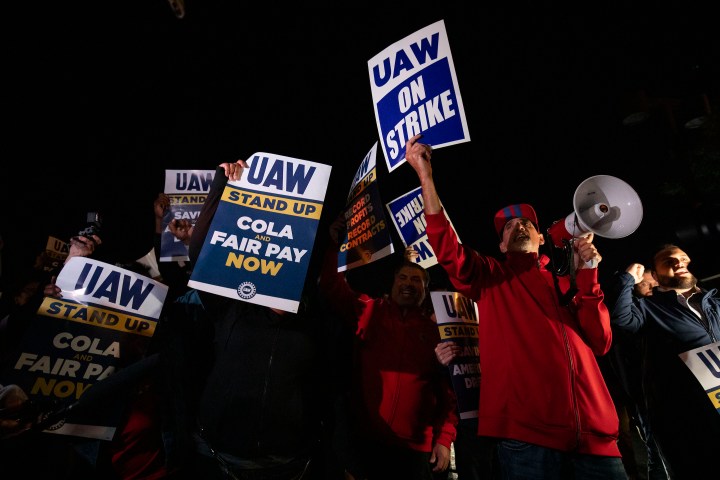
The UAW strike is also about EVs and the future of auto industry jobs
The UAW strike is also about EVs and the future of auto industry jobs

With contract negotiations ongoing, the United Autoworkers Union is now on strike. For the first time, it’s against all of the so-called Big Three car makers at the same time: General Motors, Ford, and Stellantis, the Amsterdam-based company that absorbed Chrysler and Jeep.
So far, the UAW is holding a limited strike at three plants: Wayne, Michigan; Toledo, Ohio and Wentzville, Missouri. A narrow walkout allows room for escalation if negotiations remain stuck, said union representatives. It’s also a strategy that makes the union’s $825 million dollar fund to help compensate striking workers last much longer than the 77 days it would last if all 146,000 UAW autoworkers walked off the job at once.
The dispute is about wages and benefits, but it’s also about the future of a changing industry. “Marketplace Morning Report” host David Brancaccio spoke with Erik Gordon, a professor at the University of Michigan’s Ross School of Business about implications the strike could have for electrification and the global auto industry. The following is an edited transcript of their conversation.
David Brancaccio: Let’s start with this conundrum at the White House. President Biden calls himself the most pro-labor president in history and he’s facing pressure to support the UAW here. But also he has responsibility for keeping the economy chugging along. He’s gonna be in the middle.
Erik Gordon: Oh, the poor guy is stuck, he may have the unsolvable problem. I mean, he, the UAW has said, “Don’t take us for granted. We’re not necessarily going to support you.” So he has to lean that way. But he has to keep the U.S. competitive. He has to worry about the economy. And you know, he’s the president, but he doesn’t have all that much power. All he can do is kind of jawbone them.
David Brancaccio: Jawbone them — policy can enter into this. There’s talk of setting up some kind of federal help for small auto industry suppliers. I mean, not the big car companies, but the network, the ecosystem of companies that feed the auto industry out there.
Erik Gordon: That’s sort of a sideways way of approaching it. It won’t solve the strike, the big strike, but it will help some unionized workers at the smaller suppliers that surround every assembly plant. So it’s a way of him saying, “Hey, labor, look, I’m doing something for you. Even though I can’t get you what you want in the big strike.”
David Brancaccio: Now, we’ve been doing a lot of coverage over wage demands and the push to switch back to guaranteed monthly payments for pensions, those systems. But as electrification proceeds, car companies are dealing with a lot of non-union competition, but the UAW wants to know that if a person can’t work in a gas or diesel powered engine plant anymore, that there will be union work for them at an electric car or battery plant. The union doesn’t want, I don’t know, electrification to be a car company strategy for de-unionization.
Erik Gordon: Yeah, and this is where both sides probably have their backs against the wall. You can understand that workers want to keep their jobs. Technology changes, sure, but that doesn’t mean I want to be out of work, does it? On the other hand, the car companies have their backs against the non-union competition wall, they already are at a cost disadvantage. And the last thing they need is for that cost disadvantage to widen. So, you know, you could be in a situation where short-term, UAW workers get bigger pay some more guarantees, but those guarantees don’t protect their jobs against non-union competition from Tesla or from non-U.S. companies. They could win the strike battle and lose the jobs-for-life war.
David Brancaccio: That has happened before, right? If you go back in the history of the auto industry.
Erik Gordon: Oh, yeah. I mean, when I was a kid, the Big Three ruled, they had 80 or 90% market share, then their costs, you know, visa vie the new imports, which at that time are from Japan, got out of line. Today, the big three have 50%. That’s all. 50% market share in the U.S. So we have seen this movie before.
There’s a lot happening in the world. Through it all, Marketplace is here for you.
You rely on Marketplace to break down the world’s events and tell you how it affects you in a fact-based, approachable way. We rely on your financial support to keep making that possible.
Your donation today powers the independent journalism that you rely on. For just $5/month, you can help sustain Marketplace so we can keep reporting on the things that matter to you.

















